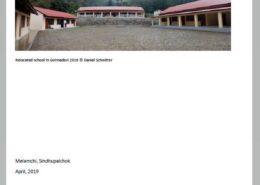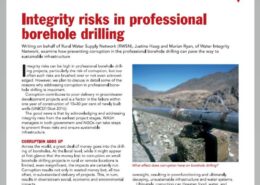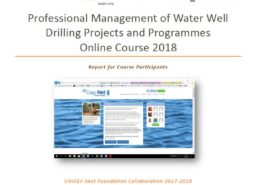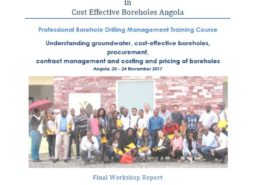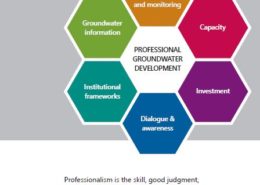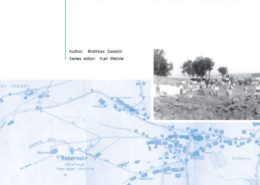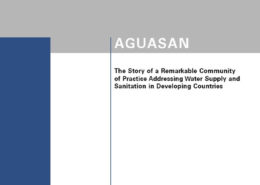
Performance and prospects of rural drinking water services in francophone West Africa
This study looks at the evolution of rural water supply policies in francophone West Africa and the performance of the delegation of rural water services. Since the 1980s, rural water services have been predominantly managed by community-based organisations. In parallel, many countries have followed a decentralisation process and transferred the mandate for rural water services to the local level.
The six countries reviewed in this study (Benin, Burkina Faso, Mali, Mauritania, Niger and Senegal) were selected given their long experience with the delegation of rural water services at the local level, some of them since the 1990s; and recent reforms in some of these countries towards re-centralisation of rural water mandates and delegation of rural water services at a much wider regional scale (Mauritania, Senegal and Benin).
One of the key messages of the report is that the delegation of water services in rural areas is not a panacea, or claiming to be the sole alternative to community-based management. In many countries there is a gap between theory and practice, with alternative models for rural water services delivery co-existing with informal arrangements, where services should have been delegated.
Increased efficiencies and better performance of service provision are a key factor for motivating these reforms. West African countries have experimented with clustering/ aggregating/ consolidating infrastructure to delegate rural water services at the scale of several municipalities, a district or a region, including through contracts to regroup several local authorities, such as (i) Design, Build and Operate contracts (DBO), (ii) regional delegation of rural water services, and (iii) intermunicipal arrangements.
This study identifies some of the key questions in this ongoing debate, which necessitate further reflection:
• Will the move to re-centralise rural water service authorities improve financing, performance monitoring and asset management?
• Where decentralisation is ongoing, what will the role of local stakeholders (including local government) be in countries that have recently re-centralised the rural water sector? Will they be able to hold service authorities and operators accountable?
• In contexts where it has been decided not to subsidise rural water tariffs, how should water services delivery be funded sustainably while ensuring equity between rural and urban residents?
• Will regulation evolve to ensure the sustainability of rural water services under delegation?
• In contexts where international expertise is needed to deliver universal rural water services in the short-term, how will local capacity be developed to ensure the sustainability of rural water services in the long-term?
The 20 latest Blog Posts
- On the water’s edge
- Auf des Wassers Scheide
- International Women’s Day
- WHO Guidelines for drinking-water quality – launch event
- Empowering local communities
- Erfolge der Schweizer Allianz gegen den Hunger
- Bolivia: My first business
- Zusammenarbeit mit Studierenden des MOK der HSG
- Sharing experiences at the World Resources Forum 2023
- RWSN at the World Water Week 2023
- MOK Students and Skat Foundation
- Coaching session to Karim and Frederik’s project
- Skat Foundation celebrates its 20-year anniversary
- The RWSN was present at the IRC All Systems Connect Symposium 2023
- Karim Malik and Frederick Steinmann win the Stockholm Junior Water Prize – Switzerland 2023!
- Dipti Vaghela in Die Wirtschaftsfrau
- Our Annual Report 2022 is out!
- Success Stories: Renewable Energy Training of Trainers
- Menschenrecht auf Wasser – Von St. Gallen bis New York
- Human rights to water – From St. Gallen to New York
The 8 latest Portfolio Entries
Available Pages
- About us
- Afghanistan
- Annual Reports and Finances
- Blue Communities
- Bolivia
- Bolivia women and youth
- Colombia
- Contact us
- Costa Rica
- Data Privacy Policy
- Data Privacy Policy of Skat
- Documenting Knowledge
- DONATE
- Donate to Ukraine’s reconstruction
- Finances
- Funding
- Hands4health
- Home
- HPNET
- Knowledge Brokering
- MBM Tax Grid Page. Do NOT remove this page or edit it except to change template.
- MBM Tax Grid Page. Do NOT remove this page or edit it except to change template.
- Nepal
- Networks
- News
- Nicaragua
- Open Positions
- Organisation
- Our Networks
- Our Projects
- Our projects in Bolivia
- Our Story
- Our Team
- Partnerships
- REACH – improving water security for the poor (Knowledge Broker)
- REACH – improving water security for the poor (Research into Use)
- REAL Water
- Rolling out TAF in Tanzania
- Rural Water Supply Network (RWSN)
- Sharing Knowledge
- Sharing Knowledge
- Short films
- SIRWASH
- SolarChill Development, Testing And Technology Transfer Outreach
- Spenden – Ukraine (in German)
- Synthesising & Documenting Knowledge
- Tanzania
- Tanzania WASH access
- Tanzania-ToT
- Tender – Renewable Energies in Afghanistan: A digital knowledge platform (Phase II)
- Training courses
- Training on Sustainable Waste Management in Central and South America
- Ukraine
- UPGro – Unlocking the Potential of Groundwater for the Poor (Knowledge Broker)
- WASHTech
- Webinars
- What we do
- Workshops
- Zambia
- Publications search
Archives by Subject:
Archives by Month:
- March 2024
- February 2024
- December 2023
- October 2023
- September 2023
- August 2023
- July 2023
- June 2023
- May 2023
- April 2023
- February 2023
- January 2023
- November 2022
- October 2022
- September 2022
- August 2022
- July 2022
- June 2022
- May 2022
- March 2022
- February 2022
- January 2022
- December 2021
- November 2021
- October 2021
- September 2021
- August 2021
- July 2021
- August 2020
- May 2018
- April 2018
- January 2018
- July 2017
- June 2017
- March 2017
- January 2017

